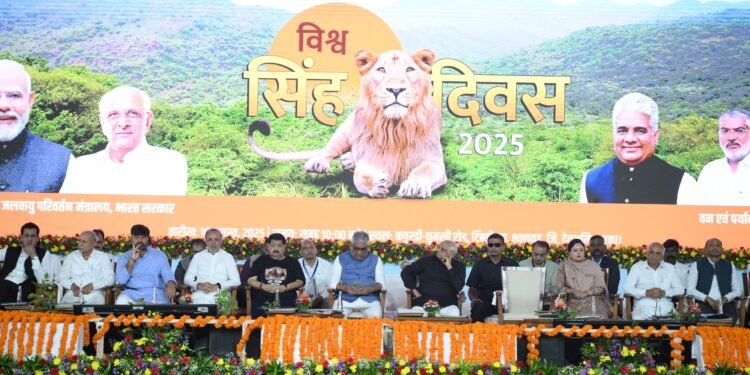New Delhi- The Ministry of Environment, Forest and Climate Change, in collaboration with Gujarat’s Forest and Environment Department, celebrated World Lion Day 2025 today at the Barda Wildlife Sanctuary in Devbhumi Dwarka district, Gujarat. The event was chaired by Union Minister for Environment, Forest and Climate Change, Shri Bhupender Yadav, along with Gujarat Chief Minister Shri Bhupendra Patel. Gujarat Forest Minister Shri Mulubhai Bera, MPs, MLAs, and other public representatives were also present.
Addressing the gathering, Shri Yadav expressed happiness over the remarkable rise in the Asiatic lion population in India—from 674 in 2020 to an estimated 891 in 2025. He noted that in 1990 there were only 284 lions, but their numbers have grown by 32 percent since 2020 and by 70 percent over the past decade. Calling this a “remarkable conservation success,” the Union Minister credited the achievement to the visionary leadership of Prime Minister Shri Narendra Modi, who prioritized Project Lion during his tenure as Gujarat’s Chief Minister and later as Prime Minister.
He congratulated forest officials, wildlife enthusiasts, and environmentalists for their role, stressing that such progress was possible only through collective will, dedication, and coexistence-based policies. He reaffirmed the government’s commitment to building a developed India where humans and wildlife thrive together, ensuring the conservation momentum continues for future generations.
Highlighting Gujarat’s unique role, Shri Yadav said, “It is a matter of immense national pride that the only place in the world where Asiatic lions exist today is Gir in Gujarat. Our relentless conservation efforts have doubled their numbers over the past decade, giving new hope to global wildlife conservation.”
Chief Minister Shri Bhupendra Patel reiterated Gujarat’s commitment to conserving and increasing the Asiatic lion population, noting that under PM Modi’s guidance and with scientific conservation measures and sustained community participation, lion numbers in the state rose from 674 to 891 in recent years. He announced major investments worth Rs180 crore for new habitats, advanced veterinary care, and eco-tourism infrastructure, terming it a significant milestone. He pointed out that after 143 years, lions have returned to the Barda region, restoring ecological balance and enriching the state’s natural heritage.
The Chief Minister emphasized Gujarat’s leadership in active habitat management, reducing human-wildlife conflict, and creating livelihood opportunities for local communities, ensuring that “the roar of the Asiatic lion will remain the pride of Gujarat and the heritage of India.”
World Lion Day, observed annually on August 10, aims to raise global awareness on lion conservation and protection. In Gujarat, the Asiatic lion is an exclusive ecological and cultural treasure found only in the Saurashtra region. Under Project Lion, continuous efforts by the ministry and the state government have made significant progress in ensuring the survival and prosperity of this historic species.
On August 15, 2020, during his 74th Independence Day address from the Red Fort, Prime Minister Narendra Modi announced Project Lion to ensure the long-term conservation of Asiatic lions. The MoEFCC approved a ten-year project with a total budget of Rs2,927.71 crore for lion conservation, including a National Wildlife Health Care Centre for which Gujarat allocated 20.24 hectares in New Pipaliya, Junagadh district.
A grand celebration was also held across 11 districts of Saurashtra to promote awareness about lion conservation. Asiatic lions roam freely over nearly 35,000 sq km in these districts, with their population rising by 32 percent since 2020. Barda Wildlife Sanctuary, spread over 192.31 sq km in Porbandar and Devbhumi Dwarka districts, has emerged as the second home for Asiatic lions. After natural relocation in 2023, Barda now hosts 17 lions—6 adults and 11 cubs.
Given its proximity to the Dwarka-Porbandar-Somnath tourism circuit, Barda has high tourism potential. Plans are underway to develop a safari park over 248 hectares, with the state government allocating the required land. The Union Government has also approved policy support for developing the Barda Safari Park and Zoo, boosting eco-tourism while strengthening conservation efforts in the landscape.



